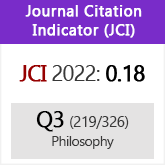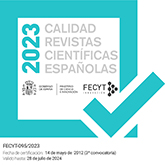Common good, common goods, for whom? Challenging the atomistic view of civil society
DOI:
https://doi.org/10.3989/isegoria.2022.66.18Keywords:
Common good, Common goods, Civil society, Individual freedom, AtomismAbstract
The aim of the paper is to clarify what is properly common to the common good and to support its irreducibility as a guarantee of overcoming an atomistic conception of civil society. We begin by addressing the notion of individual freedom and the questioning of the selfish condition of the human being. Then, we delve into the normative possibilities offered by an ethical interpretation of the common good. The difference of the common good from other notions used in late-modern discourses is key in determining the intrinsic commonality of social relations. In concluding, we argue for a conception of the common good that accommodates individual freedom, understanding it no longer in isolation, but as part of intersubjectivity.
Downloads
References
Albareda, L. y Sison, A. J. G. (2020). "Commons Organizing: Embedding Common Good and Institutions for Collective Action. Insights from Ethics and Economics", Journal of Business Ethics, 166, pp. 727-743. https://doi.org/10.1007/s10551-020-04580-8
Aristóteles (1970). Política. Instituto de Estudios Políticos.
Aristóteles (1999). Ética a Nicómaco. Instituto de Estudios Políticos.
Bentham, J. (1962). "Tracts on Poor Laws and Pauper Management", The words of Jeremy Bentham. Vol. 8, Russell & Russell, pp. 369-439.
Bollier, D. y Helfrich, S. (2015). "Overture", en D. Bollier y S. Helfrich (Eds.), Patterns for commoning). Levellers Press, pp. 1-12.
Cornes, R. y Sandler, T. (1996). The Theory of Externalities, Public Goods and Club Goods. Cambridge University Press. https://doi.org/10.1017/CBO9781139174312
Cortina, A. (2009). Ética de la razón cordial. Educar en la ciudadanía en el siglo XXI. Oviedo: Nobel.
Cruz, M. y García, A. (2013). "Horizontes de lo común: sujetos y comunidades post-identitarios", Isegoría, 49, pp. 373-376. https://doi.org/10.3989/isegoria.2013.049.00
De Angelis, M. (2017). Omnia sunt Communia: On the commons and the transformation to postcapitalism. The University of Chicago Press. https://doi.org/10.5040/9781350221611
Deneulin, S. y Townsen, N. (2007). "Public goods, global public goods and the common good", International Journal of Social Economics, 34 (1-2), pp. 19-36. https://doi.org/10.1108/03068290710723345
González, G. (2015). "Bienes comun(al)es y bien común. Una propuesta de descolonización", Utopía y Praxis Latinoamericana, vol. 20, núm. 69, pp. 35-52.
Gracia, J. (2010). "Posibilidad de un individualismo holista", Isegoría, 42, pp. 199-213. https://doi.org/10.3989/isegoria.2010.i42.691
Gracia, J. (2012). "¿Lo justo versus lo bueno? Sobre» lo justo« en la filosofía de Charles Taylor", Pensamiento, 257, pp. 413-426.
Gracia, J. y Tamarit, I. (2021). "Education as a common good from capability approach", Journal of Philosophy of Education, 55, pp. 817-828. https://doi.org/10.1111/1467-9752.12575
Hardin, G. (1968). "The tragedy of the commons", Science, 162 (1), pp. 1243-1248. https://doi.org/10.1126/science.162.3859.1243
Hess, C. H. y Ostrom, E. (2003). "Introduction", en C. H. Hess y E. Ostrom (Eds.), Understanding knowledge as a commons. MIT Press.
Hussain, W. (2018). "Common Good", Stanford Encyclopedia of Philosophy. https://plato.stanford.edu/entries/common-good/ [consultado: 7 de julio de 2021]
MacIntyre, A. (1984). After virtue. A Study of Moral Theory (2ª edición). University of Notre Dame Press. https://doi.org/10.2307/1051043
Offe, C. (2001). "Wessen Wohl ist das Gemeinwohl?', en Lutz Wingert and Klaus Günther (eds.), Die Offentlichkeit der Vernunft und die Vernunft der Offentlichkeit: Festschrift für Jürgen Habermas. Suhrkamp, pp. 459-488.
Olson, M. (1965). The Logic of Collective Action: Public Goods and the Theory of Groups. Cambridge University Press.
Ostrom, E. (1990). Governing the Commons: The Evolution of Institutions for Collective Action. Cambridge University Press. https://doi.org/10.1017/CBO9780511807763
Ostrom, E. y Nagendra, H. (2010). "Governing the commons in the new Millennium: a Diversity of institutions for natural Resource Management", en Ilka y Andreas Ruby, Re-Inventing Construction. Ruby Press, pp. 380-387.
Pakaluk, M. (2001). "Is the common good of political society limited and instrumental?". The Review of Metaphysics, 55 (1), pp. 57-94.
Rawls, J. (1995). Teoría de la justicia. Fondo de Cultura Económica.
Reyes, M. (2020). "After civility as a lost faculty: brief aristotelian-contractualist theoretical debate", Otrosiglo. Revista de Filosofía 4 (2), pp. 86-106.
Sandel, M. (1982). Liberalism and the Limits of Justice. Cambridge University Press.
Sandel, M. (2016). Justicia. ¿Hacemos lo que debemos? DeBolsillo.
Sandel, M. (2020). La tiranía del mérito. ¿Qué ha sido del bien común? Debate.
Samuelson, P. A. (1954). "The Pure Theory of Public Expenditure". Review of Economics and Statistics, 36-4, November, pp. 387-389. https://doi.org/10.2307/1925895
Schwan, A. (1995). "Gemeinwohl", in Staatslexikon: Recht, Wirtschaft und Gesellschaft. Herder, vol. 2, p. 859.
Taylor, C. (1989). Source of the Self. Harvard University Press.
Taylor, C. (1997a). "La irreductibilidad de los bienes sociales", Argumentos filosóficos. Paidós, pp. 175-198.
Taylor, C. (1997b). "Equívocos: el debate liberalismo-comunitarismo", Argumentos filosóficos. Paidós. pp. 239-268.
Unesco (2015). Replantear la educación. ¿Hacia un bien común global? Unesco.
Watzlawick, P., Beavin, J. y Jackson, D. (1989). Teoría de la comunicación humana. Interacciones patologías y paradojas. Barcelona: Herder.
Weber, M. (2002). Economía y sociedad. Esbozo de sociología comprensiva. Madrid: Fondo de Cultura Económica.
Published
How to Cite
Issue
Section
License
Copyright (c) 2022 Consejo Superior de Investigaciones Científicas (CSIC)

This work is licensed under a Creative Commons Attribution 4.0 International License.
© CSIC. Manuscripts published in both the printed and online versions of this Journal are the property of Consejo Superior de Investigaciones Científicas, and quoting this source is a requirement for any partial or full reproduction.All contents of this electronic edition, except where otherwise noted, are distributed under a “Creative Commons Attribution 4.0 International” (CC BY 4.0) License. You may read here the basic information and the legal text of the license. The indication of the CC BY 4.0 License must be expressly stated in this way when necessary.
Self-archiving in repositories, personal webpages or similar, of any version other than the published by the Editor, is not allowed.
Funding data
Ministerio de Ciencia, Innovación y Universidades
Grant numbers PID2019-109078RB-C22














